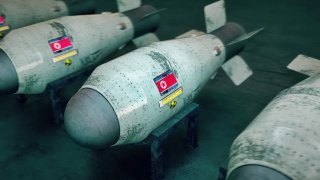What Will Donald Trump Do if North Korea Tests a Nuclear Weapon?
The Columbia-class ballistic missile submarines, designed to replace the aging Ohio-class, come with a hefty price tag—around $13 billion per sub. These advanced subs will bolster U.S. nuclear deterrence by maintaining a stealthy, survivable second-strike capability.
What You Need to Know: The Columbia-class ballistic missile submarines, designed to replace the aging Ohio-class, come with a hefty price tag—around $13 billion per sub. These advanced subs will bolster U.S. nuclear deterrence by maintaining a stealthy, survivable second-strike capability.
-Despite the high costs and GAO reports of delays and overruns, the Navy views these expenditures as essential to uphold its nuclear triad.
-The Columbia-class subs incorporate significant innovations, including electric drive propulsion for quieter operations and reactor fuel lasting their entire service life, potentially offsetting some maintenance costs.
-Ultimately, their strategic deterrent value may justify the substantial investment.
Will North Korea Test Trump's Resolve?
There is growing speculation that North Korea could rattle sabers following the reelection of Donald Trump on Tuesday. That same day the Hermit Kingdom had fired multiple short-range ballistic missiles into its eastern sea. That included its Hwasong-19, one of its newest missiles.
Seoul, Tokyo, Washington, and the United Nations quickly condemned the test. Yet, the time remained notable.
There has been speculation that Kim Jong Un favored a win by Trump over Vice President Kamala Harris. The former and now president-elect repeatedly boasted about his "friendly" relationship with Kim despite the fact the two had numerous face-offs during Trump's first term.
Trump, who was also the first U.S. president to visit the Hermit Kingdom, had signed a joint statement with Kim that called for a "denuclearization" of the Korean Peninsula, but the talks soon stalled.
A Nuclear Test – NO October Surprise
It was just last week that officials within South Korea's military intelligence agency warned that Pyongyang could be preparing to conduct a seventh nuclear test. There had been speculation earlier this year that North Korea might carry out such a test as an "October Surprise" – as in just before the election.
Though such a test didn't occur, there could be several factors.
First, North Korea may simply have missed the deadline, but given how tightly controlled its state media is, we'll never know for sure. Instead, it is more likely that Kim opted to take a "wait-and-see" approach – perhaps even fearing that such a surprise would favor Harris.
Lucky Seven?
There is another consideration. Even with Russian expertise, North Korea may want to rattle sabers without literally shaking the ground.
It carried out its sixth and most recent nuclear test in early September 2017 at Mount Mantap. Believed to be a hydrogen bomb, it was the most powerful to date and subsequently caused an earthquake tremor that measured 6.3 on the Richter scale. Several people were killed, including North Korean children after their school collapsed.
"This latest North Korean nuclear test once again underscores the importance of universalizing the 1996 Comprehensive Test Ban Treaty," said Daryl Kimball, executive director of the Arms Control Association a day after the test.
Moscow Tit-for-Tat?
There is also speculation that Moscow could be aiding Pyongyang in its nuclear program, perhaps fulfilling a deal signed between Kim and Russian President Vladimir Putin. It was just last month that thousands of North Korean "volunteers" arrived in Russia to aid the Kremlin in its unprovoked war in Ukraine.
The quality of the troops has been put in question, with reports that some have deserted while others have become quickly "addicted" to online pornography as they have greater Internet access in Russia than they had in their homeland.
Author Experience and Expertise: Peter Suciu
Peter Suciu is a Michigan-based writer. He has contributed to more than four dozen magazines, newspapers, and websites with over 3,200 published pieces over a twenty-year career in journalism. He regularly writes about military hardware, firearms history, cybersecurity, politics, and international affairs. Peter is also a Contributing Writer for Forbes and Clearance Jobs. You can follow him on Twitter: @PeterSuciu. You can email the author: [email protected].
Image Credit: Creative Commons and/or Shutterstock.


